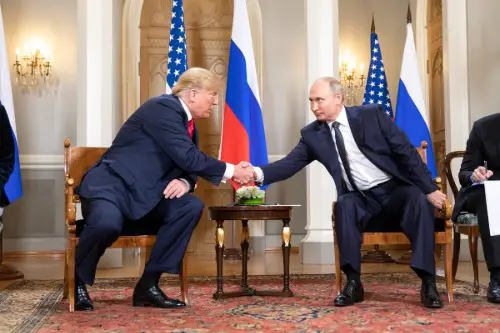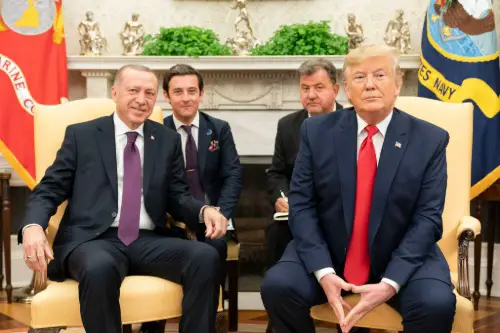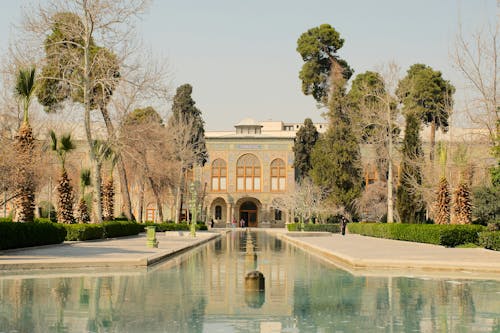1. Russia

At first glance, you might think the vibes between Russia and the new American administration would be tense — but they’re actually… not. The new president has dramatically scaled back U.S. support for Ukraine, delaying military aid and backing off earlier commitments that helped Kyiv resist Russian aggression. That move has been a major win for the Kremlin, both strategically and symbolically. Russian state media has had a field day painting the U.S. as weak, divided, and no longer a serious global power.
That said, average Russians still don’t have warm feelings toward the U.S., even under the new leadership. Decades of anti-American messaging and sanctions have built a lot of mistrust. While the Kremlin is pleased, everyday Russians still view the U.S. as meddling and arrogant. Especially those opposed to the Russian government, according to Jon Richardson of the Lowy Institute.
2. France

France has always had a complicated love-hate relationship with the U.S., but things got frostier after the new American president backed out of several climate commitments early in the term. French leaders, especially President Emmanuel Macron, were visibly annoyed at the reversal, seeing it as a betrayal of joint efforts to combat global warming. Macron even gave a speech in English, aimed squarely at American audiences, offering France as a better partner for scientists and climate experts. That subtle shade wasn’t lost on anyone.
There’s also been tension over global trade policy, according to Clea Caulcutt of Politico. The new U.S. administration prioritized more isolationist economic strategies, which clashed with France’s pro-EU stance. Add in disagreements over NATO contributions and America’s shifting position on Ukraine, and Paris has reasons to side-eye D.C. lately. French public opinion polls also show a dip in favorable views of America in the last year.
3. Germany

Germany isn’t thrilled with how the new U.S. leadership has handled foreign affairs, particularly in Europe, according to John Kampfner of Politico. The fears of weakening NATO support when tensions with Russia are at a high have been making things difficult. Germans generally value stability, and the whiplash from one American administration to the next hasn’t helped.
There was also frustration over trade tariffs being reimposed on some European imports. Germany’s export-heavy economy sees this kind of policy as needlessly antagonistic. When the U.S. also started pulling back on green tech cooperation, that hit a nerve in Berlin. German media hasn’t been subtle in their criticisms, either.
4. Mexico

Mexico’s relationship with the U.S. has become increasingly strained under the new American administration, according to Thomas Graham of The Guardian. President Claudia Sheinbaum, who took office in October 2024, has faced challenges in navigating the shifting dynamics. The U.S. has imposed a 5% tax on remittances sent by non-citizen immigrants, a move that Sheinbaum publicly condemned as harmful to Mexican families relying on this income. Additionally, the U.S. has designated several Mexican cartels as foreign terrorist organizations, leading to heightened tensions over sovereignty and security cooperation.
Sheinbaum has also rejected U.S. proposals for military operations within Mexico to combat cartels, emphasizing national sovereignty. The appointment of Ronald D. Johnson, a former U.S. Army Green Beret and CIA officer, as the U.S. ambassador to Mexico signals a more aggressive stance from Washington. These developments have led to a cooling of diplomatic relations, with Mexican officials expressing concern over the U.S.’s unilateral actions. Public sentiment in Mexico reflects this tension, as many citizens view the new American policies as overreaching and detrimental to bilateral cooperation.
5. Canada

Canada usually gets along pretty well with whoever’s in charge down south, but the latest administration has caused some serious side-eye moments. For starters, the decision to revoke permits for cross-border energy projects like Keystone XL hit Ottawa hard. That pipeline was a major investment and jobs promise for Canada, and it was canceled with very little warning. Canadian officials were not amused.
Trade disputes over lumber and dairy have also flared up again, despite previous promises to work collaboratively. Add in inconsistent messaging about border reopening during COVID and what you get is a partner who feels taken for granted. Prime Minister Justin Trudeau has tried to stay diplomatic, but relations have definitely cooled. Canadian news outlets have reflected that shift in tone clearly.
6. Brazil

Brazil’s government didn’t vibe with the new president’s environmental push, especially when it came with pointed criticism of deforestation in the Amazon. While global concern about the rainforest is understandable, Brazilian leaders felt the U.S. was using it as a moral cudgel without offering real support. The new administration threatened sanctions and trade barriers tied to environmental metrics, which ruffled feathers in Brasília. It came off as condescending to many.
The two countries also clashed on energy policy. Brazil is heavily invested in oil and biofuels, and American pressure to move away from fossil fuels came across as hypocritical. As a result, public trust in American leadership dipped. You can feel the chill in diplomatic statements from Brazilian officials.
7. India

India was initially hopeful about closer ties, but that faded quickly once the new president started publicly criticizing the country’s human rights record. There were strong statements about religious freedom and treatment of minorities in India, which drew sharp responses from Indian officials. Many saw it as tone-deaf and hypocritical coming from a country with its own issues. It didn’t help that these criticisms were aired without much diplomatic finesse.
India also felt left out of key trade and tech alliances that the U.S. was forming elsewhere. Despite being a natural partner to balance China, India wasn’t prioritized in the administration’s early strategic planning. That left Indian analysts wondering if Washington really sees them as a core ally. Trust dipped in Indian public opinion surveys as a result.
8. China

No surprise here—relations with China have gone from cold to colder under the new president. The administration doubled down on restrictions against Chinese tech companies and expanded export controls. Beijing saw these moves as part of a broader containment strategy, not just competition. The tone has been openly confrontational on everything from trade to Taiwan.
The U.S. also led several Indo-Pacific alliances clearly aimed at countering China’s influence. While that’s strategic on Washington’s part, it’s naturally provoked some resentment in Beijing. Chinese state media has relentlessly attacked American credibility and leadership. So while diplomatic channels remain open, the vibe is definitely icy.
9. Turkey

Turkey and the U.S. have been frenemies for a while, but the tension escalated under the new administration due to a combination of human rights criticisms and military policy. The White House openly criticized Turkey’s record on press freedom and democracy, which Turkish President Erdoğan called interference. The U.S. also slowed down arms deals and continued to push back on Turkey’s ties with Russia. Ankara did not appreciate being boxed in.
To make matters worse, the administration officially recognized the Armenian genocide, a move previous presidents had avoided for the sake of diplomacy. That decision, though historically significant, sent U.S.–Turkey relations into a tailspin. Turkish media portrayed it as a betrayal. Many Turks now view the U.S. as an unreliable and moralizing partner.
10. Iran

Iran was hopeful for a return to diplomacy, but that fizzled fast. The new administration promised a revival of nuclear talks but added more preconditions and sanctions instead. That was seen in Tehran as a bait-and-switch. Iranian leaders publicly accused the U.S. of negotiating in bad faith.
The lack of progress on sanctions relief has hurt Iran’s economy deeply. Meanwhile, U.S. support for regional rivals like Saudi Arabia and Israel has only reinforced Iranian skepticism. Anti-American rhetoric has surged again in Iranian media. The window for improved relations is closing—if not already closed.
11. South Africa

South Africa’s leadership has been vocal about feeling sidelined in the new administration’s foreign policy playbook. Pretoria was notably left out of several high-profile summits and forums hosted by the U.S. on global trade and health. There’s a sense that Africa was deprioritized in favor of other strategic regions. South Africa, as a continental powerhouse, found that insulting.
Tensions also rose when the U.S. criticized South Africa’s neutral stance on the Russia-Ukraine war. Washington wanted allies to fall in line, but South Africa refused, emphasizing its non-aligned principles. In response, the U.S. threatened to reevaluate trade benefits, which didn’t sit well. The result? A dip in both diplomatic warmth and public perception.
12. Pakistan

The relationship between Pakistan and the U.S. has long been complicated, but the new president’s pivot toward India didn’t go unnoticed. Islamabad felt snubbed when it wasn’t included in major regional strategy conversations. The administration’s cool tone and lack of engagement on key security issues frustrated Pakistani officials. It was seen as a strategic downgrade.
On top of that, U.S. drone activity and counterterrorism operations continued in the region with minimal consultation. Pakistani leaders saw this as a violation of sovereignty. Trust has eroded, and anti-American sentiment has surged again in political circles and the media. That makes future cooperation more difficult.
13. Saudi Arabia

Things have been tense between Riyadh and Washington ever since the new president promised to “recalibrate” the relationship. That meant pulling back military support and calling out human rights abuses, including the killing of journalist Jamal Khashoggi. While those criticisms were welcomed by some, they didn’t sit well with the Saudi leadership. Crown Prince Mohammed bin Salman reportedly refused calls from Washington for a while.
Then came the oil drama. The U.S. pressured Saudi Arabia to increase oil production to lower global prices, and Saudi Arabia basically said, “No thanks.” The refusal added to economic tensions and showed that Riyadh was willing to defy Washington. It’s not a breakup, but it’s definitely a cold stretch.
14. Venezuela

The U.S. has long had a rocky relationship with Venezuela, and the new administration hasn’t exactly warmed things up. Despite signaling openness to diplomacy, the White House maintained heavy sanctions and continued to back opposition figures. That felt like business as usual to Caracas, despite the change in tone. Venezuelan leaders were quick to label the policies as regime change by other means.
The administration did briefly open talks on oil, but they were short-lived and heavily criticized at home. This back-and-forth didn’t help credibility. State-run media in Venezuela continues to paint America as an imperial bully. And that narrative still resonates with many citizens who’ve lived through years of tension.


